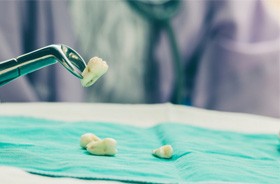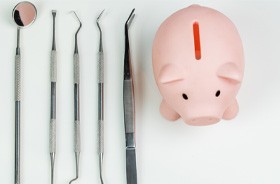
Tooth Extractions – Torrington, CT
Safe & Comfortable Care Every Time
At Torrington Dental Care, we strive to provide safe and comfortable care every time. As part of our efforts, we endeavor help you enjoy your full set of natural teeth for life. However, there are emergency circumstances where one or more teeth may be beyond saving, requiring an extraction. Our skilled dentists can perform tooth extractions here in-office, saving patients valuable time that would otherwise be spent traveling to a specialist.
Why Choose Torrington Dental Care for Tooth Extractions?
- Expert Team with Decades of Experience
- Oral Sedation Available for a Pain-Free Procedure
- State-of-the-Art Tooth Replacement Available
Reasons Why Tooth Extractions Are Necessary

You may need to undergo a tooth extraction if:
- A tooth has a cavity that is too big to be repaired with a filling or crown.
- An infection in one tooth is starting to threaten those around it.
- A tooth is so severely fractured that it cannot be restored.
- Advanced gum disease has significantly weakened the bone supporting a tooth.
- Room needs to be created in the mouth for a new denture or upcoming orthodontic treatment.
- One or more baby teeth have overstayed their welcome, blocking the path for incoming adult teeth.
- A tooth is impacted (stuck beneath the gumline).
The Process of Removing a Tooth

The process of removing a tooth is pretty straightforward in most cases. We will begin by making sure your mouth is numb. If circumstances dictate, we will also administer a dose of sedation to make you comfortable and relaxed.
Once you are ready, we will use an instrument called an elevator to lift the tooth from its socket. Next, your dentist will grip the tooth with forceps and gently rock it back and forth in order to break the ligaments that are holding it in place. Once the tooth is out of your mouth, we may place some gauze at the extraction site to control bleeding.
Follow-up care may involve planning for tooth replacement. This is important because a gap in your smile could lead to future tooth loss and other complications.
Tooth Extraction Aftercare

Here are some practical things you can do to facilitate a fast and problem-free recovery:
- Take all medications as recommended by your dentist.
- After the first 24 hours, rinse your mouth with warm salt water.
- Do not smoke or drink alcoholic beverages.
- Avoid strenuous physical exertion.
- Keep your head elevated while you are resting.
- Get adequate amounts of sleep.
- Eat a diet of soft foods that will not irritate your extraction site.
You should also be sure to attend all recommended follow-up appointments with our team. If appropriate, we will plan your tooth replacement as soon as possible so you will not have to go long without a complete set of teeth. Investing in a dental implant can preserve your jawbone, ensure you have a strong bite force, and prevent your natural teeth from drifting out of place.
Understanding the Cost of Tooth Extractions

The cost of tooth extractions can vary from case to case. Generally speaking, though, the procedure is affordable for most patients. During your consultation, we will be able to provide you with a personalized cost estimate. We can also assist you as you learn about your payment options, such as insurance and financing. We aim to make the financial aspect of your care as low-stress as possible.
Factors That Can Affect Tooth Extraction Cost

We cannot determine the exact price of a procedure until we have had time to work out its details. Some factors that could affect tooth extraction cost include:
- The tooth that needs to be extracted. Some teeth are more challenging to remove than others. For example, a tooth that is stuck beneath the gumline may be difficult to extract and incur higher fees.
- The number of teeth that need to be removed. Logically, removing one tooth costs less than removing several.
- The overall complexity of the case. We can handle most tooth extractions right here in our office. If we must refer you to an outside specialist, you may face a higher overall cost.
- Additional care. Sedation during your procedure, as well as tooth replacement afterward, can add to the total price of your care. Some patients may also require gum disease therapy or other services to optimize their oral health.
Does Dental Insurance Cover Tooth Extractions?

In most cases, yes, dental insurance does cover tooth extractions. Simple extractions are often classed as a minor service, meaning that up to 80% of their price may be covered. Surgical extractions may be just 50% covered. You will have to look at your unique policy to see how it applies to your situation. Our practice accepts many forms of insurance, and we will be happy to help you navigate your benefits, understand your out-of-pocket obligation, and file all necessary claims.
Other Options for Making Tooth Extractions Affordable

Insurance is just one possible way to make tooth extractions more affordable. Other provisions include:
- Most patients qualify for a low-interest payment plan through CareCredit. Our team can assist you through the application process.
- Essential Dental Plan. If you do not have dental insurance, consider signing up for the Essential Dental Plan. It is a discount plan that offers reduced fees on virtually all of the services available in our Torrington practice.
You should not let financial worries hold you back from getting the care you need. To learn more about tooth extractions and their cost, get in touch with our team. We will do all we can to help you understand the price of your procedure and pay for it in a way that will not break your budget.
Tooth Extraction FAQs

We understand that the prospect of getting a tooth removed can be somewhat intimidating. It may put your mind at ease if you have more information about the road ahead. To assist you, we have compiled answers to some frequently asked questions about tooth extractions. If you do not see your specific questions addressed, reach out to us directly. We look forward to speaking with you.
Does Getting a Tooth Extracted Hurt?
Patient comfort is very important during tooth extractions. We use plenty of local anesthesia to numb the tooth and the area around it. Keep in mind, though, that while the anesthesia blocks pains signals, you will still be able to feel some pressure during your procedure. If it is difficult for you to get numbed or you are particularly anxious about your extraction, ask us if you are a candidate for sedation.
After any anesthesia and sedation wear off, you can expect your mouth to be sore for at least a few days. We will give you detailed posttreatment instructions to make your recovery as comfortable as possible.
Is There an Alternative to a Tooth Extraction?
Whether or not there is an alternative to a tooth extraction depends on your specific situation. In some cases, root canal therapy can preserve a badly damaged tooth. Other restorative treatments may also play a role in preventing the need for tooth removal.
Generally speaking, though, we only recommend extraction if there are no other viable options. We strive to do everything in our power to help our patients retain their natural teeth for as long as possible.
What Are My Options for Replacing a Missing Tooth?
There are a number of ways to replace a missing tooth:
- We often recommend dental implants. An implant replaces the root of a lost tooth, and it is topped with a crown to replace the visible portion of the missing tooth. The structure of implants makes them the best form of tooth replacement.
- A dental bridge is another possible option. A bridge typically consists of two crowns, which get placed over the teeth next to an empty space (called the abutment teeth). The crowns support an artificial tooth between them.
- If you have multiple missing teeth, we may recommend that get you get a full or partial denture. These removable prosthetics are natural-looking, cost-effective, and easy to care for.
Can I Leave the Space Empty After a Tooth Extraction?
If the tooth that got removed was supernumerary (extra), there is no need to replace it. In most other cases, though, tooth replacement is necessary. Leaving the space empty could allow nearby teeth to drift out of place, causing your bite to become misaligned. The tooth above an empty space could even over-erupt to the point where it falls out altogether.
To prevent future complications and further tooth loss, we strongly recommend that patients replace their missing teeth as soon as possible.